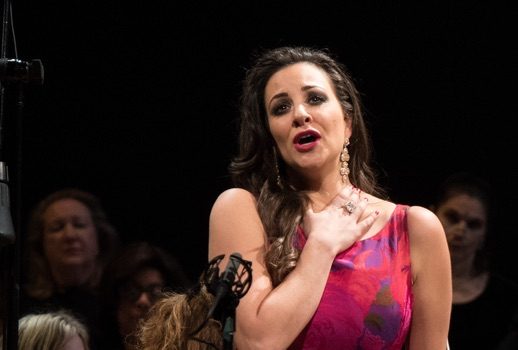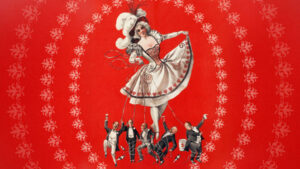 Operatic history can be cruel where multiple works with the same subject are concerned, generally consigning all but one example to obscurity, or at best the fringes of the regular repertory.
Operatic history can be cruel where multiple works with the same subject are concerned, generally consigning all but one example to obscurity, or at best the fringes of the regular repertory.
In the case of Massenet’s 1881 Hérodiade, it isn’t hard to see how the work’s gentle melodies and crowd-pleasing Orientalism became hopelessly uncool in the wake of Richard Strauss’ blockbuster treatment of the Salome story a quarter century later. Yet, as demonstrated by a committed, strongly cast performance by Washington Concert Opera this past Sunday, these judgments can be unfair.
For his sophomore work on the international stage, the 36 year-old Massenet returned to the vicinity of his 1877 breakout hit, Le Roi de Lahore, with another grand opera in an exotic locale. After failing to secure an opening at either the Paris Opera or La Scala, Hérodiade opened at La Monnaie in December 1881 to a warm reception (including a rowdy bunch of Parisians music scenesters who had hopped the train for the occasion). It would go on to play 55 performances in Brussels that season, followed by a healthy showing across Europe and the world in subsequent decades before falling out of favor. Though it has never appeared at the Met, occasional revivals include a mid-90s San Francisco effort starring Placido Domingo, Renee Fleming and Dolora Zajick which produced a live recording.
The French libretto by Paul Milliet and Henri Grémont (who would later reteam to more lasting effect with Werther) was crafted from an Italian libretto by Angelo Zanardini, originally based on Flaubert’s novella “Hérodias.” The similarities between the final product and Flaubert’s dreamy flight of biblical impressionism are mostly superficial, the librettists having taken to the source material with all the fidelity of modern-day Hollywood writers charged with punching up a property. Instead of the strange, brutal ancients hinted at by Flaubert and memorably dramatized by Wilde and Strauss in later years, we get juicy drama and a tidy collection of familiar characters.
Salomé here is a far cry from Strauss’ manic teen sex kitten. Abandoned by Hérodias, this Salomé has been sneaking off to Bible study and has fallen in love with one Jean le Baptiste. The young lovers are troubled both by Jean’s reluctance to give into earthly love as well as his precarious position vis a vis Hérodias (who does not appreciate his frequent cries of “Jezabel!”) and Hérode, who plans to use Jean in a revolt against the Romans, but is also partial to Jean’s girlfriend. Hérodeis a sort of Count di Luna type mostly guilty of pining after the ingenue while being a baritone (the opera seems ambivalent about whether this Herod is a creep or not).
Hérodias gets top billing in Flaubert for arranging the infamous dance and precipitating the story’s grisly ending, but the opera excises both dance and decapitation, leaving her role somewhat unclear beyond “bitter mezzo with a past.” Hérodiade finds herself both remorseful for abandoning her daughter but also despising her daughter for stealing away Hérode’s affections.
In the end, Hérode’s unrequited lust turns deadly, and he threatens to execute both Salome and Jean. When Jean is executed (offstage, no head) and she is pardoned, Salome blames Hérodiade and vengefully stabs herself. Also there’s a lot more political intrigue involving the Romans.
Hérodiade isn’t the tightest libretto, and it’s easy to see why it might fail to make an immediate connection with modern audiences. As with a lot of grand opera, the excessive plot layers make it tough to get invested in the story, and the twists and turns can feel dated and melodramatic. But if the parts don’t quite add up to a fulfilling whole, it is rarely dull, with a steady procession of incident filled scenes and mercifully concise pageantry and intrigue sections.
And of course there is much to appreciate in Massenet’s evocative and often transporting score. Major statements for the characters, several of which have found a second life on the recital stage, are frequently memorable, as are a series of highly dramatic ensembles, all imbued with gorgeous French lyricism. To flesh out the biblical setting, Massenet creates a kaleidoscope of alluring colors and makes inventive and varied use of the orchestra.
Indeed, it’s a score that seems especially well-suited for the concert opera treatment where one can engage more directly with the orchestra, and WCO Maestro Antony Walker again demonstrated the advantages of this format for an unfamiliar work. Walker excelled in a number of heady climaxes, driving the large pickup forces to some exhilarating tempi, including in the monumental Act III finale, which had its nail biting moments but ultimately came off splendidly.
Walker also proved a sensitive accompanist for the singers, highlighting some of the rich interplay between the vocal lines and Massenet’s orchestral effects. If there were some shaggy moments and misfires here and there in the orchestra, they did not detract from a compelling overall reading.
But the evening really belonged to an outstanding cast of dynamic voices, several new to me, who displayed an infectious enthusiasm for introducing this work to new listeners.
The evening’s marquee name, Michael Fabiano, who previously appeared with WCO in 2013’s concert of Il Corsaro, returned to sing Jean, easily enchanting the audience with that golden, irresistible tone and a compelling French sound. Outside of the big numbers, Fabiano’s reading of the part was perhaps the most exploratory, and once in awhile he pushed too far through a climax and ended up in an unpleasant shouty place. But his gorgeous Act IV “Adieu donc, vains objets,” a ravishing, if tardy, revelation of his love for Salomé, and their frantic subsequent duet were clear highlights of the evening.
Soprano Joyce El-Khoury tackled nice-girl Salomé with a beguiling, sensual sound, bringing delicate pianissimo effects to her big first act number about her crush on Jean, “Il est doux, il est bon,” with only a bit of strain in some of the higher passages. “Charme des jours passés,” an anguished reminiscence of happier days with Jean after his Act III imprisonment, featured big polished top notes and a dusky, inviting middle register.
Dana Beth Miller, stepping into the production just a week ago as Hérodiade , turned out to be the evening’s biggest coup. Her commanding mezzo is distinguished by a prominent but tightly controlled vibrato that lends substantial excitement and character to her sound, as well as blazing, and at times terrifying, top notes, which she used to great effect throughout the score. Her passionate Act I plea to Hérode to execute Jean, “Ne me refuse pas,” and fiery contributions to the following trio with Jean and Herod as well as other ensembles all exhibited a fierce dramatic commitment.
As Hérode, Ricardo Rivera’s light, liquid baritone and sense of French style infused the Tetrarch’s frequently lyric passages with tender longing, while Wei Wu, one of the breakout stars of recent Washington National Opera young artist cohorts, applied his concentrated, elegant bass to court astrologer Phanuel.
A few hiccups aside, the chorus, prepared by Bruce Stasyna, did strong work with a vast amount of material, including notable contributions like a beautiful hushed chorus for the Jewish crowd in Act III.
Despite having thoroughly enjoyed this, it still seems unlikely that opera companies will be clamoring to present Hérodiade on a regular basis anytime soon, at least in its original sandals and palm fronds incarnation. On the other hand, this show is just begging for a thorough deconstruction. Enterprising directors looking for an easy target who would also like to do a good deed and familiarize new audiences with some awfully pretty Massenet music should take note.
Photo: Don Lassell




